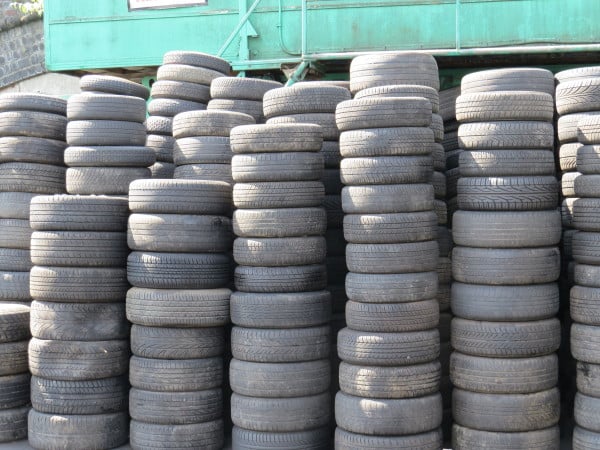Exporters of used tyres from the UK need to be better prepared for potential foreign import restrictions, as some of the current destinations begin to establish internal waste collections.
That’s according to Peter Taylor OBE, secretary general of the Tyre Recovery Association (TRA), who was speaking with letsrecycle.com about some of the issues facing the industry today.
According to UK trade statistics, approximately £3 million worth of tyres are exported annually to other EU countries, including many in Eastern Europe, while just under £1.5 million worth are exported to non-EU countries, mainly India.
Mr Taylor, who received an OBE for services to the tyre industry in 2008, explained that despite the export market being an important recovery route, the market needs to be better prepared for potential changes.
“We are over dependent on export, most definitely, and the bulk of it goes to India,” Mr Taylor explained.
“Frankly, they have enough of their own, and if they don’t now then they soon will. The problem there is collections, it is easier to buy ‘waste’ than collect it yourself in India, but that will change soon, India have made moves on that already.
“We need to be prepared for that in a way perhaps the plastics people weren’t. You can’t switch these on overnight you need a business environment which is investable.”
Landfill ban
In 2003, the majority of whole tyres were banned from being placed in landfill sites (see letsrecycle.com story), while three years later the disposal of shredded tyres was also banned.
While many energy from waste operators have spoken highly of the calorific value of shredded tyres in plants, emerging technologies such as pyrolysis, and others, have provided a new way of recycling tyres.
The TRA secretary general added that despite feeling that the current market is not where it needs to be to create a “fully-investable market”, he can see things changing.

The UK tyre export market needs to be better prepared for potential foreign import restrictions, according to Peter Taylor OBE
“We are a bit short of that goal but I can see things changing, I really can. We have pyrolysis, which is about to have its day. However, these plants can take at least a year,” he stated.
Mr Taylor commented that pyrolysis will be a growth market for tyres. He said: “It’s about finding a usage for the pyrolysis derived materials, especially if the Environment Agency deems it as waste and not a product. We need joined up thinking, there has been a tendency to over-regulate the permitted operators and ignore the rest.”
Illegal operators
Across the waste sector, the issue of ‘illegal operators’ is often brought up when discussing how things can be improved.
Often, the issue for the Environment Agency is that it is often funded on a cost-recovery option, so clamping down on so-called ‘rogue operators’ can be challenging if it cannot cover costs.
This was highlighted at the WEEE conference in June 2018 by Chris Grove of the Environment Agency, when discussing the issue of ‘free-riders’ in WEEE market, who place items on the market but do not pay for their collection (see letsrecycle.com story).
Mr Grove said: “We have a dedicated team looking at free riders but we are limited a certain extent on what we can do due to issues with funding. Because we are funded largely on a cost recover basis, we can only use the money we receive from fee payers to regulate the fee payers and use that to look at free riders or people that are playing the system.”
Since Mr Grove spoke, there have been some indications recently that changes to the approach to funding action against waste crime may feature in the Resources and Waste Strategy, although Treasury approval would be needed.
“I think that licensed operators need a level playing field. If you are rivalled against those with one third of the costs it is de-stabilising and unfair.”
Peter Taylor OBE
Tyre Recovery Association
Level playing field
However, Mr Taylor added that while he understands the limits of revenue, he is hoping the government can help legitimate operators in other ways.
He said: “I think that licensed operators need a level playing field. If you are rivalled against those with one third of the costs it is de-stabilising and unfair.
“From government itself we need supported regulation not that which is burdensome. There is often a tendency to introduce new regulations to solve problems, but if we are more reactive, look at the market and see what can provide stability that can provide future.”
The post Used tyre exporters ‘will face import restrictions’ appeared first on letsrecycle.com.
Source: letsrecycle.com Waste Managment




